[September-2021]Download NSE6_FWF-6.4 Dumps Free from Braindump2go[Q1-Q21]
September/2021 Latest Braindump2go NSE6_FWF-6.4 Exam Dumps with PDF and VCE Free Updated Today! Following are some new NSE6_FWF-6.4 Real Exam Questions!
QUESTION 1
What type of design model does FortiPlanner use in wireless design project?
A. Architectural model
B. Predictive model
C. Analytical model
D. Integration model
Answer: A
Explanation:
FortiPlanner will look familiar to anyone who has used architectural or home design software.
Reference: http://en.hackdig.com/?7883.htm
QUESTION 2
Refer to the exhibits.
Exhibit A
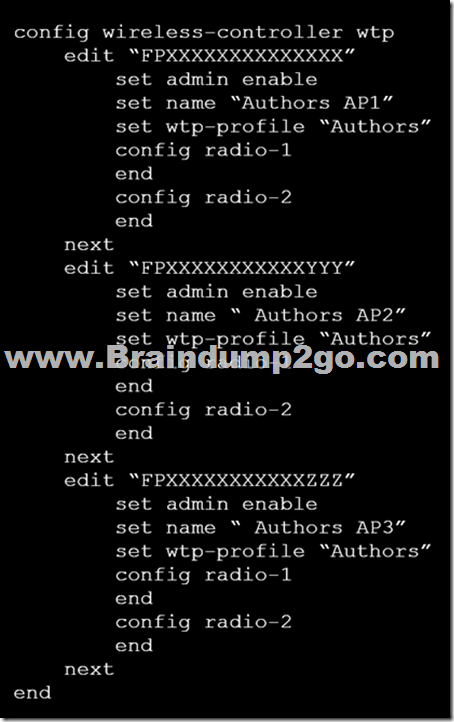
Exhibit B
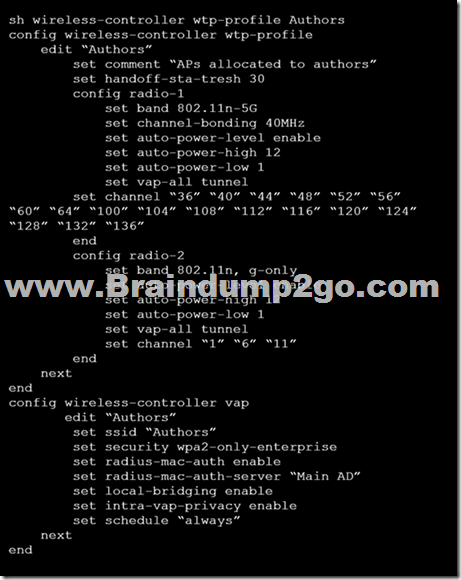
A wireless network has been created to support a group of users in a specific area of a building. The wireless network is configured but users are unable to connect to it. The exhibits show the relevant controller configuration for the APs and the wireless network.
Which two configuration changes will resolve the issue? (Choose two.)
A. For both interfaces in the wtp-profile, configure set vaps to be “Authors”
B. Disable intra-vap-privacy for the Authors vap-wireless network
C. For both interfaces in the wtp-profile, configure vap-all to be manual
D. Increase the transmission power of the AP radio interfaces
Answer: BC
QUESTION 3
A tunnel mode wireless network is configured on a FortiGate wireless controller.
Which task must be completed before the wireless network can be used?
A. The wireless network interface must be assigned a Layer 3 address
B. Security Fabric and HTTPS must be enabled on the wireless network interface
C. The wireless network to Internet firewall policy must be configured
D. The new network must be manually assigned to a FortiAP profile.
Answer: C
Explanation:
A FortiGate unit is an industry leading enterprise firewall. In addition to consolidating all the functions of a network firewall, IPS, anti-malware, VPN, WAN optimization, Web filtering, and application control in a single platform, FortiGate also has an integrated Wi-Fi controller.
Reference: https://fortinetweb.s3.amazonaws.com/docs.fortinet.com/v2/attachments/723e20ad-5098-11e9-94bf-00505692583a/FortiWiFi_and_FortiAP-6.2.0-Configuration_Guide.pdf
QUESTION 4
Which statement is correct about security profiles on FortiAP devices?
A. Security profiles on FortiAP devices can use FortiGate subscription to inspect the traffic
B. Only bridge mode SSIDs can apply the security profiles
C. Disable DTLS on FortiAP
D. FortiGate performs inspection the wireless traffic
Answer: B
Explanation:
https://docs.fortinet.com/document/fortiap/6.4.0/fortiwifi-and-fortiap-configuration-guide/47321/fortiap-s-bridge-mode-security-profiles
QUESTION 5
How are wireless clients assigned to a dynamic VLAN configured for hash mode?
A. Using the current number of wireless clients connected to the SSID and the number of IPs available in the least busy VLAN
B. Using the current number of wireless clients connected to the SSID and the number of clients allocated to each of the VLANs
C. Using the current number of wireless clients connected to the SSID and the number of VLANs available in the pool
D. Using the current number of wireless clients connected to the SSID and the group the FortiAP is a member of
Answer: C
Explanation:
VLAN from the VLAN pool based on a hash of the current number of SSID clients and the number of entries in the VLAN pool.
Reference: https://docs.fortinet.com/document/fortiap/7.0.1/fortiwifi-and-fortiap-configuration-guide/376326/configuring-dynamic-user-vlan-assignment
QUESTION 6
Which two statements about distributed automatic radio resource provisioning (DARRP) are correct? (Choose two.)
A. DARRP performs continuous spectrum analysis to detect sources of interference. It uses this information to allow the AP to select the optimum channel.
B. DARRP performs measurements of the number of BSSIDs and their signal strength (RSSI). The controller then uses this information to select the optimum channel for the AP.
C. DARRP measurements can be scheduled to occur at specific times.
D. DARRP requires that wireless intrusion detection (WIDS) be enabled to detect neighboring devices.
Answer: AD
Explanation:
DARRP (Distributed Automatic Radio Resource Provisioning) technology ensures the wireless infrastructure is always optimized to deliver maximum performance. Fortinet APs enabled with this advanced feature continuously monitor the RF environment for interference, noise and signals from neighboring APs, enabling the FortiGate WLAN Controller to determine the optimal RF power levels for each AP on the network. When a new AP is provisioned, DARRP also ensures that it chooses the optimal channel, without administrator intervention.
Reference: http://www.corex.at/Produktinfos/FortiOS_Wireless.pdf
QUESTION 7
Which factor is the best indicator of wireless client connection quality?
A. Downstream link rate, the connection rate for the AP to the client
B. The receive signal strength (RSS) of the client at the AP
C. Upstream link rate, the connection rate for the client to the AP
D. The channel utilization of the channel the client is using
Answer: B
Explanation:
SSI, or “Received Signal Strength Indicator,” is a measurement of how well your device can hear a signal from an access point or router. It’s a value that is useful for determining if you have enough signal to get a good wireless connection.
Reference: https://www.metageek.com/training/resources/understanding-rssi.html
QUESTION 8
When configuring Auto TX Power control on an AP radio, which two statements best describe how the radio responds? (Choose two.)
A. When the AP detects any other wireless signal stronger that -70 dBm, it will reduce its transmission power until it reaches the minimum configured TX power limit.
B. When the AP detects PF Interference from an unknown source such as a cordless phone with a signal stronger that -70 dBm, it will increase its transmission power until it reaches the maximum configured TX power limit.
C. When the AP detects any wireless client signal weaker than -70 dBm, it will reduce its transmission power until it reaches the maximum configured TX power limit.
D. When the AP detects any interference from a trusted neighboring AP stronger that -70 dBm, it will reduce its transmission power until it reaches the minimum configured TX power limit.
Answer: AC
Explanation:
https://www.watchguard.com/help/docs/help-center/en-US/Content/en-US/Fireware/wireless/ap_wireless_signalstrength_c.html
QUESTION 9
Refer to the exhibits.
Exhibit A.
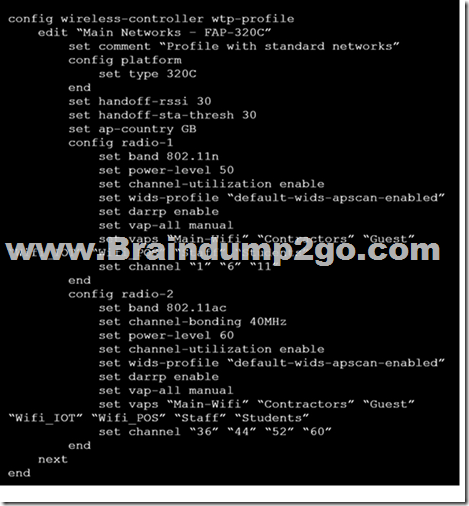
Exhibit B.
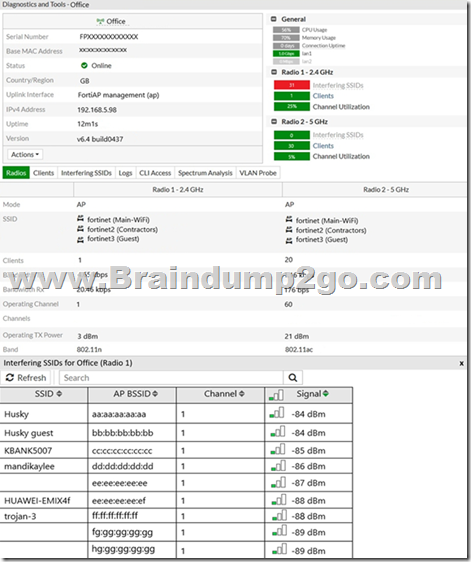
Exhibit C.
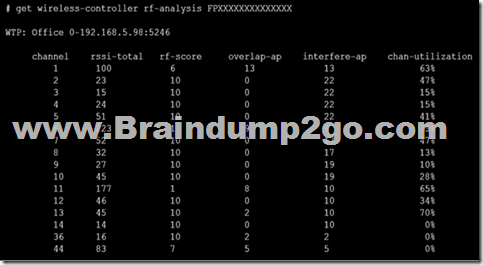
A wireless network has been installed in a small office building and is being used by a business to connect its wireless clients. The network is used for multiple purposes, including corporate access, guest access, and connecting point-of-sale and IoТ devices.
Users connecting to the guest network located in the reception area are reporting slow performance. The network administrator is reviewing the information shown in the exhibits as part of the ongoing investigation of the problem. They show the profile used for the AP and the controller RF analysis output together with a screenshot of the GUI showing a summary of the AP and its neighboring APs.
To improve performance for the users connecting to the guest network in this area, which configuration change is most likely to improve performance?
A. Increase the transmission power of the AP radios
B. Enable frequency handoff on the AP to band steer clients
C. Reduce the number of wireless networks being broadcast by the AP
D. Install another AP in the reception area to improve available bandwidth
Answer: A
QUESTION 10
Which two statements about background rogue scanning are correct? (Choose two.)
A. A dedicated radio configured for background scanning can support the connection of wireless clients
B. When detecting rogue APs, a dedicated radio configured for background scanning can suppress the rogue AP
C. Background rogue scanning requires DARRP to be enabled on the AP instance
D. A dedicated radio configured for background scanning can detect rogue devices on all other channels in its configured frequency band.
Answer: AB
Explanation:
To enable rogue AP scanning
Reference: https://fortinetweb.s3.amazonaws.com/docs.fortinet.com/v2/attachments/723e20ad-5098-11e9-94bf-00505692583a/FortiWiFi_and_FortiAP-6.2.0-Configuration_Guide.pdf
QUESTION 11
When configuring a wireless network for dynamic VLAN allocation, which three IETF attributes must be supplied by the radius server? (Choose three.)
A. 81 Tunnel-Private-Group-ID
B. 65 Tunnel-Medium-Type
C. 83 Tunnel-Preference
D. 58 Egress-VLAN-Name
E. 64 Tunnel-Type
Answer: ABE
Explanation:
The RADIUS user attributes used for the VLAN ID assignment are:
IETF 64 (Tunnel Type)–Set this to VLAN.
IETF 65 (Tunnel Medium Type)–Set this to 802
IETF 81 (Tunnel Private Group ID)–Set this to VLAN ID.
Reference: https://www.cisco.com/c/en/us/support/docs/wireless-mobility/wireless-vlan/71683-dynamicvlan-config.html
QUESTION 12
Where in the controller interface can you find a wireless client’s upstream and downstream link rates?
A. On the AP CLI, using the cw_diag ksta command
B. On the controller CLI, using the diag wireless-controller wlac -d sta command
C. On the AP CLI, using the cw_diag -d sta command
D. On the controller CLI, using the WiFi Client monitor
Answer: B
QUESTION 13
Which administrative access method must be enabled on a FortiGate interface to allow APs to connect and function?
A. Security Fabric
B. SSH
C. HTTPS
D. FortiTelemetry
Answer: A
Explanation:
https://docs.fortinet.com/document/fortigate/6.2.9/cookbook/788897/configuring-the-root-fortigate-and-downstream-fortigates
QUESTION 14
You are investigating a wireless performance issue and you are trying to audit the neighboring APs in the PF environment. You review the Rogue APs widget on the GUI but it is empty, despite the known presence of other APs.
Which configuration change will allow neighboring APs to be successfully detected?
A. Enable Locate WiFi clients when not connected in the relevant AP profiles.
B. Enable Monitor channel utilization on the relevant AP profiles.
C. Ensure that all allowed channels are enabled for the AP radios.
D. Enable Radio resource provisioning on the relevant AP profiles.
Answer: D
Explanation:
The ARRP (Automatic Radio Resource Provisioning) profile improves upon DARRP (Distributed Automatic Radio Resource Provisioning) by allowing more factors to be considered to optimize channel selection among FortiAPs. DARRP uses the neighbor APs channels and signal strength collected from the background scan for channel selection.
Reference: https://docs.fortinet.com/document/fortigate/6.4.0/new-features/228374/add-arrp-profile-for-wireless-controller-6-4-2
QUESTION 15
Which two roles does FortiPresence analytics assist in generating presence reports? (Choose two.)
A. Gathering details about on site visitors
B. Predicting the number of guest users visiting on-site
C. Comparing current data with historical records
D. Reporting potential threats by guests on site
Answer: AB
Explanation:
https://fortinetweb.s3.amazonaws.com/docs.fortinet.com/v2/attachments/457ebad4-2437-11e9-b20a-f8bc1258b856/FortiPresence-v2.0-getting-started.pdf
QUESTION 16
Six APs are located in a remotely based branch office and are managed by a centrally hosted FortiGate. Multiple wireless users frequently connect and roam between the APs in the remote office.
The network they connect to, is secured with WPA2-PSK. As currently configured, the WAN connection between the branch office and the centrally hosted FortiGate is unreliable.
Which configuration would enable the most reliable wireless connectivity for the remote clients?
A. Configure a tunnel mode wireless network and enable split tunneling to the local network
B. Configure a bridge mode wireless network and enable the Local standalone configuration option
C. Configure a bridge mode wireless network and enable the Local authentication configuration option
D. Install supported FortiAP and configure a bridge mode wireless network
Answer: A
QUESTION 17
Refer to the exhibit.

If the signal is set to -68 dB on the FortiPlanner site survey reading, which statement is correct regarding the coverage area?
A. Areas with the signal strength equal to -68 dB are zoomed in to provide better visibility
B. Areas with the signal strength weaker than -68 dB are cut out of the map
C. Areas with the signal strength equal or stronger than -68 dB are highlighted in multicolor
D. Areas with the signal strength weaker than -68 dB are highlighted in orange and red to indicate that no signal was propagated by the APs.
Answer: C
QUESTION 18
Which statement describes FortiPresence location map functionality?
A. Provides real-time insight into user movements
B. Provides real-time insight into user online activity
C. Provides real-time insight into user purchase activity
D. Provides real-time insight into user usage stats
Answer: D
Explanation:
This geographical data analysis provides real-time insights into user behavior.
Reference: https://fortinetweb.s3.amazonaws.com/docs.fortinet.com/v2/attachments/05d8bae1-5f3c-11e9-81a4-00505692583a/FortiPresence-v2.0.1-getting-started.pdf
QUESTION 19
Refer to the exhibits.
Exhibit A
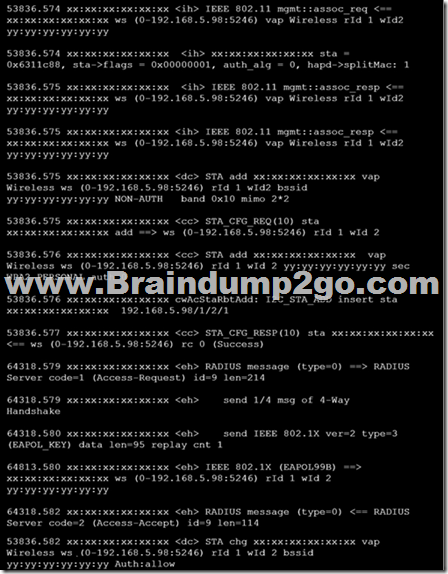
Exhibit B
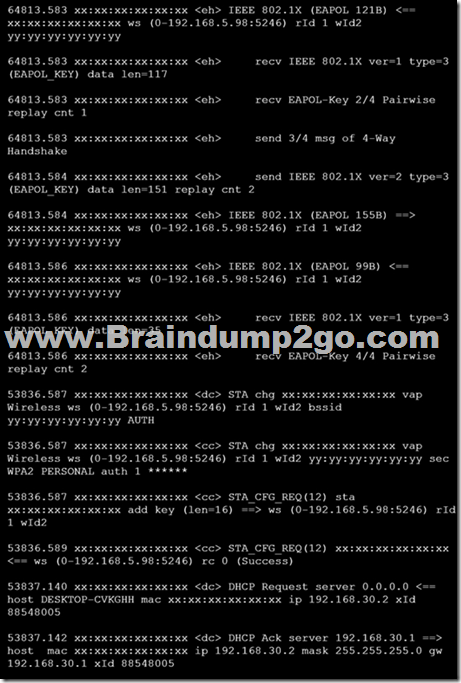
The exhibits show the diagnose debug log of a station connection taken on the controller CLI.
Which security mode is used by the wireless connection?
A. WPA2 Enterprise
B. WPA3 Enterprise
C. WPA2 Personal and radius MAC filtering
D. Open, with radius MAC filtering
Answer: A
Explanation:
Best security option is WPA2-AES.
Reference: https://www.esecurityplanet.com/trends/the-best-security-for-wireless-networks/
QUESTION 20
Which of the following is a requirement to generate analytic reports using on-site FortiPresence deployment?
A. SQL services must be running
B. Two wireless APs must be sending data
C. DTLS encryption on wireless traffic must be turned off
D. Wireless network security must be set to open
Answer: B
Explanation:
FortiPresence VM is deployed locally on your site and consists of two virtual machines. All the analytics data collected and computed resides locally on the VMs.
Reference: https://fortinetweb.s3.amazonaws.com/docs.fortinet.com/v2/attachments/30bd9962-44e8-11eb-b9ad-00505692583a/FortiPresence_VM-1.0.0-Administration_Guide.pdf
QUESTION 21
Which two phases are part of the process to plan a wireless design project? (Choose two.)
A. Project information phase
B. Hardware selection phase
C. Site survey phase
D. Installation phase
Answer: CD
Explanation:
https://www.sciencedirect.com/topics/computer-science/wireless-site-survey
https://www.automation.com/en-us/articles/2015-2/wireless-device-network-planning-and-design
Resources From:
1.2021 Latest Braindump2go NSE6_FWF-6.4 Exam Dumps (PDF & VCE) Free Share:
https://www.braindump2go.com/nse6-fwf-6-4.html
2.2021 Latest Braindump2go NSE6_FWF-6.4 PDF and NSE6_FWF-6.4 VCE Dumps Free Share:
https://drive.google.com/drive/folders/1FQfxzMd9mhRIgt6xVImgZb-o7QfUKvZL?usp=sharing
3.2021 Free Braindump2go NSE6_FWF-6.4 Exam Questions Download:
https://www.braindump2go.com/free-online-pdf/NSE6_FWF-6.4-PDF-Dumps(1-10).pdf
https://www.braindump2go.com/free-online-pdf/NSE6_FWF-6.4-VCE-Dumps(11-22).pdf
Free Resources from Braindump2go,We Devoted to Helping You 100% Pass All Exams!